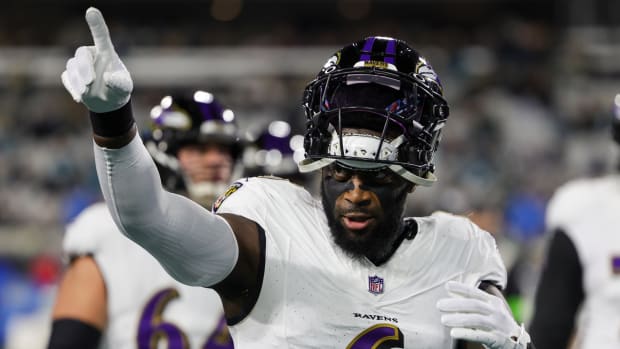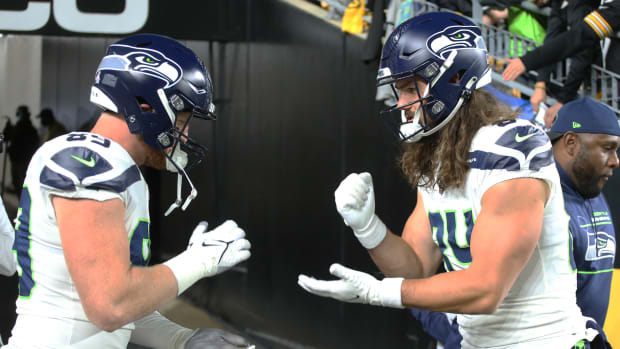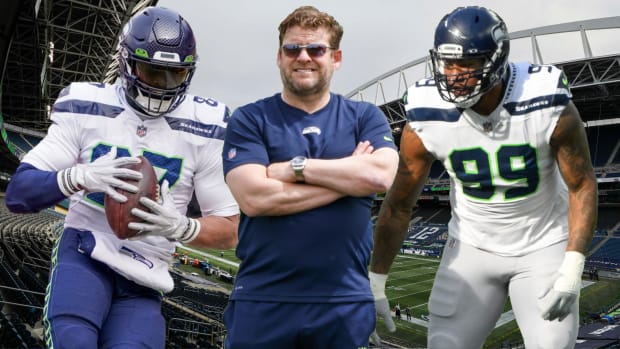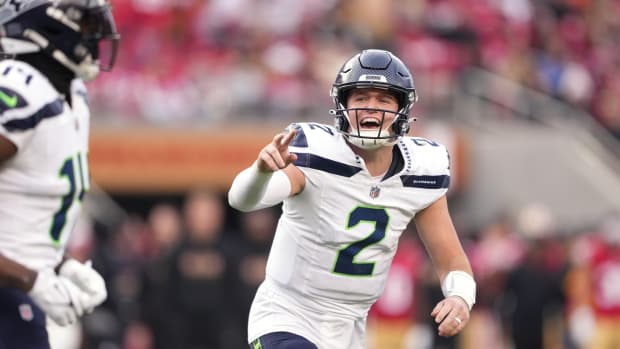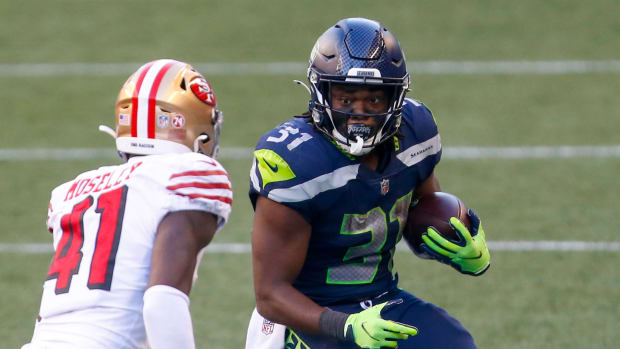How American Race Relations Shaped Lives of Current, Former Seahawks
George Floyd’s death has reignited a long-standing conversation many Americans have been trying to have for several years and decades: The Black and white experience has largely remained separate and unequal in our country.
In the words of Seahawks receiver Tyler Lockett and the demonstrations by Colin Kaepernick, Black NFL players “don’t feel free in the land of the free.”
While eyes are opening to the realities of inequality and excessive police brutality, structural racism has affected and shaped the lives of several Seahawks players in the past and present. Here are a few examples offering a glimpse into the complex difficulties Black Americans face all over the nation.
Former Seahawks guard D.J. Fluker grew up in New Orleans’s Ninth Ward, a historically poor Black neighborhood that exemplifies the structural racism Black neighborhoods experience due to economic isolation and marginalization. Here is a 2003 quote from a non-profit consultant and Ninth Ward resident responding to the area’s 9% higher poverty rate relative to the rest of the city:
“Poverty is closely tied to ethnicity and race in this country. If you look anywhere where there is a majority of black people in a community, you are going to see higher concentrations of poverty, and it is going to be higher because of the historical relationship between black people and white people and the economic development of this country. Racism—the fact that black people were not paid at all and later not paid equitably for the work that they did, means that black communities do not have the wealth that has been accumulated in non-black communities. For the amount of work African-Americans have done in this country, they don't have the accumulated wealth that other groups do, relative to the amount of work performed.”
The Ninth Ward was disproportionately devastated by Hurricane Katrina in 2005. Many homes were uninsured, and the area has hardly been revitalized in the 15 years since. According to a 2016 NPR feature story, “some streets are so filled with potholes, cars can't drive down them. There are a few convenience stores and fast food stands, but no supermarkets or grocery stores," a common feature of Black neighborhoods blighted by poverty and ignored by governing bodies.
Katrina’s storm surge was so strong “it knocked homes completely off their foundations," effectively destroying the neighborhood—including the uninsured Fluker family home. Less than half the population has since returned, with Fluker among them. He became a hurricane refugee and was homeless with his family for over a year while they lived in the family car.
In a 2014 Sports Illustrated profile, Fluker remembered "nights when the family would have no food and would eat out of the garbage dumpsters at fast food restaurants." Other times, he said, he and his siblings would wear pants smelling of urine because they had nowhere to wash their clothes.
Fluker continued to thrive in football due to the graciousness of a high school coach who opened his spare room to him, and he worked endlessly to become the football star that he is today. But Fluker’s background as a Ninth Ward resident and a Katrina refugee was inevitably shaped by New Orleans’s marginalization of its Black residents, many of whom have struggled to survive the life-altering devastation of Hurricane Katrina.
Seahawks rookie Jordyn Brooks also experienced homelessness during his teen years in Houston. Prevalent homelessness, even if only temporary, is not an uncommon NFL story. Raiders running back Josh Jacobs notably bought his single father a house after being homeless during his youth. It’s also a story that is disproportionately found among Black Americans.
The National Alliance To End Homelessness states that Black Americans “make up 40% of the homeless population despite only representing 13% of the general population” and “this imbalance is not improving over time.” Financially speaking, millions of Americans are a disaster away from experiencing homelessness, as the Federal Reserve reports that nearly 40% of survey respondents would have to accrue debt in some way to cover a $400 emergency.
With 20.8% of Black families living below the poverty line, which is about $25,000 for a family of four, and the economic insecurity highlighted by the Federal Reserve, homelessness becomes a distinct threat to the Black community as families work to break the poverty cycle. Brooks was able to do so, but the normalcy of going to school and playing football is disrupted by the instability of homelessness.
Second-round pick Darrell Taylor’s family was rocked by yet another issue that disproportionately affects Black families: His father was incarcerated while he was growing up.
Once again, this is not a unique story. Black men comprise 34% of the correctional population at five times the rate of white men, with 2.3 million in the prison system, according to the NAACP. Another issue is how the war on drugs has imprisoned thousands of men on non-violent drug charges, when other means of rehabilitation are safer and more effective. In countries that have decriminalized some or all illicit drugs, “drug-related crime and arrests drop, as do overdoses and drug-related diseases, public safety and health improve, and taxpayers save money.”
The criminalization of drugs also bears the marks of racial inequality: Black men are charged with drug offenses at six times the rate of white men, despite both groups reporting the same amount of usage. The war on drugs has torn thousands of men from their families when there are more evolved methods available—aside from drugs, the U.S. private prison system is widely noted as a for-profit enterprise that needs more inmates to make more money. This fuels the desire for more prisoners, and it has wounded millions of families across America, including those in the NFL.
The deaths of George Floyd, Ahmaud Arbery and Breonna Taylor—three unarmed, non-threatening individuals—are a distinct result of racial profiling and criminalization of Black and brown Americans by the police force. This too is something with which Seahawks players are all too familiar.
Quarterback Russell Wilson shared earlier this week that his father advised him at a young age to keep his hands out of his pockets at the gas station to protect himself.
"The fact my dad even had to tell me that is a problem," Wilson told reporters.
Along with Wilson, linebacker Bobby Wagner also recalled being pulled over in college while at Utah State. The officer's demeanor changed once he realized Wagner was a football player, but he understandably wondered what would have happened in that situation if he wasn't a star athlete.
"We still are scared as everybody else," Wagner reflected. "We still have those thoughts and feelings as everybody else. So we still go through those things, as everybody else."
In high school, Doug Baldwin was pulled over for what was mistakenly believed to be a stolen car. He followed the officer’s instructions and complied, but so often, those who comply are still killed, like the close-range shooting of Philando Castile when he was reaching for his wallet at the request of the officer.
Baldwin knew exactly how to act in this situation because his father, a former police officer in Pensacola, Fla., instructed him on how to act when detained by an officer. While the elder Baldwin’s sage advice helped to deescalate a potentially dangerous situation, the fact remains that Black people find themselves in this situation exponentially more often than white people.
A 2020 ACLU report conducted by Campaign Zero indicates that Black people are stopped at a 219% higher rate than white people in San Diego. The San Diego police department was 23% more likely to search Black people for contraband than white people (despite Black people being less likely to have it), and they were more likely to use force and more severe forms of force against Black citizens than white.
The ACLU report refers to a disturbing statistic from a 2019 study: 1 in 1,000 Black American men can expect to be killed by police.
A common rebuttal to calls for police reform is that these stories of Black unarmed citizens being murdered by police is purely anecdotal. But when the data is gathered, the evidence is overwhelmingly clear: Black Americans live in what is effectively a police state based on assumptions and fear—a state that harasses them regularly and goes so far as to threaten their lives.
In response to these statistics and experiences, Baldwin started a “Building Bridges” campaign with Seattle police officers and was supported by the Seahawks and the Washington state attorney general. He called all 50 state attorney generals to review their police training policies. This was in 2016.
Since then, conversations about police brutality have flared with each unjust death, but have hardly translated to widespread, fundamental change.
Baldwin’s 2016 press conference responding to the deaths of Keith Lamont Scott and Terrence Crutcher has become a haunting reminder that the criminalization of Black Americans has gone on far too long:
"When you see numerous instances like this happen, and again, you don't know all the context, but you're asking questions," Baldwin said. "And we also know that the laws that are in place and policies that are in place that protect the law enforcement from any persecution, we understand that there's an inherent risk that comes with being a police officer.
"But that should not be the case of being a citizen in the United States. There should not be an inherent risk when you have an encounter with law enforcement. There should not be a concern or worry that the law enforcement is not there to protect you. And I think that we're raising a culture or society right now that is questioning that very sentiment. And so as a human being, I can't help but sit up here and tell you how I feel and let you know that it's not OK."
Every NFL player overcomes near-impossible odds to earn a roster spot. But these current and former Seahawks, and their fellow Black athletes, have it that much harder because of a system that desperately needs drastic reform.
